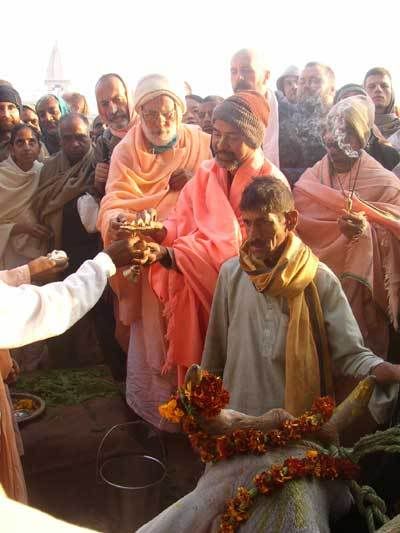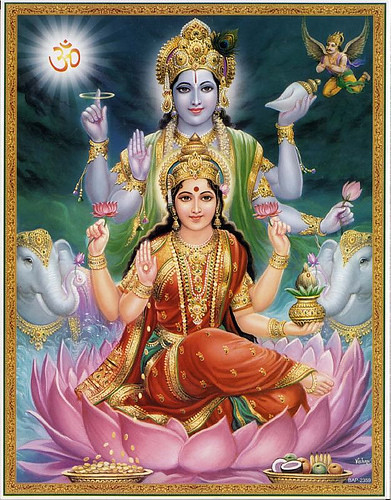acesse: www.prabhupada.com.br
 .
.
 .
.




*Todas as glórias a Sua Divina Graça A.C. Bhaktivedanta Swami Prabhupada!
*Srimad-Bhagavatam [Canto 4, Cap 17 Verso 32]
Maharaja Prthu fica irado com a Terra
Tradução
Meu querido Senhor, apesar de serdes um só, mediante Vossas potências inconcebíveis Vos expandis em muitas formas. Por intermédio de Brahma, criaste este Universo. Portanto, sois diretamente a Suprema Personalidade de Deus. Aqueles que não são suficientemente experientes não podem entender Vossas atividades transcendentais porque essas pessoas estão cobertas por Vossa energia ilusória,
Significado
Deus é um só, mas Ele Se expande em variedades de energias – a energia material, a energia espiritual, a energia marginal e assim por diante. Quem não é favorecido e especialmente ajudado com Sua graça não pode entender como a Suprema Personalidade de Deus única age através de Suas diferentes energias. As entidades vivas também fazem parte da energia marginal da Suprema Personalidade de Deus. Brahma também é uma dessas entidades vivas, mas ele é especialmente dotado de poder pela Suprema Personalidade de Deus. Embora Brahma seja considerado o criador deste universo, na verdade, a Suprema Personalidade de Deus é seu criador fundamental. Neste verso, a palavra mayaya é significativa. Maya significa “energia.” O Senhor Brahma não é o energético, mas sim uma das manifestações da energia marginal do Senhor. Em outras palavras, O Senhor Brahma é apenas um instrumento. Embora às vezes os planos pareçam contraditórios, há um plano definido por trás de todas as ações. Aquele que é experiente e é favorecido pelo Senhor pode entender que tudo está sendo feito conforme o plano supremo do Senhor.Hare Krishna Hare Krishna Krishna Krishna Hare Hare
Hare Rama Hare Rama Rama Rama Hare Hare
Quem canta Hare Krishna seus males espanta !
“Colabore”
seu servo_ gostha-vihari dasa (PS)
Iskcon_Nova Gokula
Clique no rosto da pessoa na foto para marcá-la. |
*Todas as glórias a Sua Divina Graça A.C. Bhaktivedanta Swami Prabhupada!
*Srimad-Bhagavatam [Canto 7, Cap 12 Verso 6]
As quatro classes espirituais da sociedade
Tradução
O brahmacari deve ser muito bem-comportado e cortês e não deve comer nem coletar mais do que o necessário. Deve ser sempre ativo e hábil, acreditando plenamente nas instruções do mestre espiritual e dos sastras. Tendo completo controle dos sentidos, apenas quando for necessário é que ele deve associar-se com mulheres ou com aqueles que são controlados por mulheres.
Significado
O brahmacari deve ter todo o cuidado de não se associar com mulheres ou com homens apegados a mulheres. Embora ao sair para esmolar lhe seja necessário falar com mulheres e com homens muito apegados a mulheres, essa associação deve ser muito breve, e ele deve falar com eles apenas sobre o fato de que lhes está pedindo um donativo, omitindo qualquer outra conversa. O brahmacari deve ficar muito alerta ao associar-se com homens apegados a mulheres.Hare Kṛṣṇa Hare Kṛṣṇa Kṛṣṇa Kṛṣṇa Hare Hare
Hare Rāma Hare Rāma Rāma Rāma Hare Hare
seu servo_ gostha-vihari dasa (PS)
*Srimad-Bhagavatam [Canto 4 Cap. 15 Verso 5]
Aparecimento e coroação do rei Prthu
Tradução
A mulher tem dentes tão lindos e qualidades tão belas que na verdade embelezará os adornos que usar. Seu nome será Arci. No futuro ela aceitará o rei Prthu como seu esposo.
Verso 6
Sob a forma do rei Prthu, a Suprema Personalidade de Deus aparece através de uma parte de Sua potência para proteger a população do mundo. A deusa da fortuna é a companheira constante do Senhor, e por isso encarna parcialmente como Arci para tornar-se a rainha do rei Prthu.
Significado
No Bhagavad-gita, o Senhor diz que , sempre que alguém presenciar algum poder extraordinário, deverá concluir que uma representação parcial específica da Suprema Personalidade de Deus está presente. Embora haja inúmeras personalidades assim, nem todas elas são expansões plenárias visnu-tattva diretas do Senhor. Muitas entidades vivas são classificadas entre as sakti-tattvas. Tais encarnações, dotadas de poder para propósitos específicos, são conhecidas como saktyavesa-avataras
Verso 7
O grande sábio Maitreya continuou: Meu querido Viduraji, naquela ocasião, todos os brahmanas louvaram e glorificaram sumamente o rei Prthu, e os melhores cantores de Gandharvaloka cantaram suas glórias. Os habitantes de Siddhaloka jogaram flores, e as belas mulheres nos planetas celestiais dançaram em êxtase.
Verso 8
Búzios, cornetas, tambores e timbales vibraram no espaço exterior. Grande sábios, antepassados e personalidades dos planetas celestiais vieram todos á Terra, provenientes de vários sistemas planetários.
Versos 9 – 10
O Senhor Brahma, o mestre de todo o universo, chegou ali acompanhado por todos os semideuses e seus líderes. Vendo as linhas da palma da mão do Senhor Visnu na mão direita do rei Prthu e impressões de flores de lótus nas solas de seus pés, o Senhor Brahma pôde entender que o rei Prthu era uma representação parcial da Suprema Personalidade de |Deus. Uma pessoa cuja palma da mão tem o sinal de um disco, bem como outras linhas semelhantes, deve ser considerada uma representação ou encarnação parcial do Senhor Supremo
Significado
Há um sistema mediante o qual pode-se reconhecer uma encarnação da Suprema Personalidade de Deus. Hoje em dia tornou-se moda barata aceitar qualquer patife como uma encarnação de Deus, mas, por este acontecimento, podemos ver que o Senhor Brahma examinou pessoalmente as mãos e pés do rei Prthu em busca de sinais específicos. Em suas profecias, os sábios eruditos e brahmanas aceitaram Prthu Maharaja como uma expansão parcial plenária do Senhor. Durante a presença do Senhor Krsna, entretanto, certo rei declarou ser Vasudeva, e o Senhor Krsna o matou. Antes de aceitar alguém como encarnação de Deus, deve-se verificar sua identidade de acordo com os sintomas mencionados nos sastras. Sem esses sintomas, o farsante fica sujeito a ser morto pelas autoridades por fazer-se passar por uma encarnação de Deus. *Versos lidos Por Maharaja Dhanvantari ontem 22/06/2010 no templo de Sri Sri Radha Gokulananda em Nova Gokula Ki Jaya!
*Todas as glórias a Sua Divina Graça A.C. Bhaktivedanta Swami Prabhupada!
Fundador-Acharya da Sociedade Internacional para Consciência de Krishna
Hare Krishna Hare Krishna Krishna Krishna Hare Hare
Hare Rama Hare Rama Rama Rama Hare Hare
Quem canta Hare Krishna seus males espanta !
“Colabore”
seu servo_ gostha-vihari dasa(PS)
Iskcon_Nova Gokula
i>Lacto-vegetariana>

Aparecimento e coroação do rei Prthu

Tradução
Os grandes sábios disseram: O homem é uma expansão plenária do poder do Senhor Visnu, que mantém todo o universo, e a mulher é uma expansão plenária da deusa da fortuna, que jamais se separa do Senhor.
Significado
Nesta passagem menciona-se claramente a importância de a deusa da fortuna jamais estar separada do Senhor. As pessoas no mundo material gostam muito da deusa da fortuna, e querem o favor dela sob a forma de riquezas. Elas devem saber, entretanto, que a deusa da fortuna é inseparável do Senhor Visnu. Os materialistas devem entender que a deusa da fortuna deve ser adorada juntamente com o Senhor Visnu e não deve ser considerada separadamente. Os materialistas que buscam o favor da deusa da fortuna devem adorar a o Senhor Visnu e Laksmi juntos para manterrem sua opulência material. Se um materialista adotar a política de Ravana, que queria separam Sita do Senhor Ramacandra, o processo de separação acabará com ele. Aqueles que são muito ricos e receberam o favor da deusa da fortuna neste mundo devem utilizar seu dinheiro a serviço do Senhor. Dessa maneira, poderão continuar em sua posição opulenta sem perturbações.*Todas as glórias a Sua Divina Graça A.C. Bhaktivedanta Swami Prabhupada!
Fundador-Acharya da Sociedade Internacional para Consciência de Krishna
Hare Krishna Hare Krishna Krishna Krishna Hare Hare
Hare Rama Hare Rama Rama Rama Hare Hare
Quem canta Hare Krishna seus males espanta !
“Colabore”
seu servo_ gostha-vihari dasa(PS)
 enviado por :
enviado por :*Srimad-Bhagavatam 7, 4. 31-32
Hiranyakasipu aterroriza o Universo
[Neste ensejo, descrevem-se as qualidades de Maharaja Prahlada, o filho de Hiranyakasipu.
![[gold_logo_sm.gif]](https://blogger.googleusercontent.com/img/b/R29vZ2xl/AVvXsEhVV0b8hDL4bD8Q6Oppc3QJDK9dldtJ8cjN6C3fQwVCOEV4owgWwVyTqqYTpOjS97HrcDvu-A9BmY12OjqRr0YndP-C03VCHujj0fWr8eO1H14uBfqeV4DL4lvo6bP-r6dbj7-b6fbHClo/s1600/gold_logo_sm.gif)
Significado dado por sua Divina Graça A.C. Bhaktivedanta Swami Prabhupada
Fundador-Acarya da Sociedade Internacional da Consciência de Krsna
Significado: Estas são algumas das qualificações do vaisnava. O vaisnava é automaticamente um brahmana porque o vaisnava tem todas as boas qualidades do brahmana.
samo damas tapah saucam
ksantir arjavam eva ca
jñanam vijñanam astikyam
brahma-karma svabhava-jam
“Tranqüilidade, autocontrole, austeridade, pureza, tolerância, honestidade, sabedoria, conhecimento e religiosidade – estas são as qualidades comas quais os brahmanas trabalham.” (Bg. 18.42) Estas qualidades manifestam-se no corpo do vaisnava. Portanto, como indicam aqui as palavras brahmanyah sila-sampannah, o vaisnava perfeito também é um brahmana perfeito. O vaisnava está sempre determinado a compreender a Verdade Absoluta, e, para entender a Verdade Absoluta, precisa-se exercer pleno controle sobre os sentidos e a mente. Prahlada Maharaja possuía todas estas qualidades. O vaisnava sempre é benquerente de todos. Os seis Gosvamis, por exemplo, são descritos com as seguites palavras: dhiradhira-jana-
A palavra guru aplica-se ao mestre espiritual que inicia seu discípulo no avanço da ciência de Krsna, ou consciência de Krsna, como afirma Srila Visvanatha Cakravarti Thakura (sri-bhagavan-
*Todas as glórias a Srila Prabhupada !
Hare Krishna Hare Krishna Krishna Krishna Hare Hare
Hare Rama Hare Rama Rama Rama Hare Hare
Quem canta Hare Krishna seus males espanta !
“Colabore”
